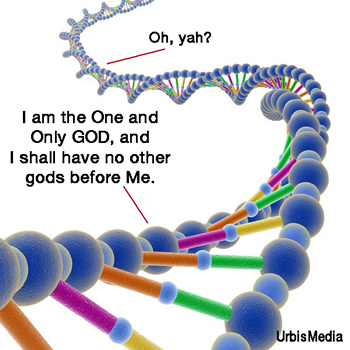
“Atheism will always be a harder sell than religion, Pascal Boyer explains, because a slew of cognitive traits predispose us to faith.” Boyer is the author of “Being human: Religion: Bound to believe?” So says the abstract of the article in the prestigious science journal Nature (455, 1038-1039, 23 October 2008) that was recently referenced in a article in Alternet that was titled “Major Scientific Journal Argues Humans Are Wired to Believe in God: Believers Rejoice, Atheists Rebut.” One can begin to see part of the problem already, in that the journal Nature does not “argue” that we are “wired to believe in God,” it only gives Paschal Boyer an opportunity to make such a case.
In any case I did not get to read the article in Nature, but the AlterNet article and a lengthier piece posted on Science 2.0 of the matter of whether we are hard wired to believe in religion by Nury Vittachi, that is based on Boyer’s article.
While we are awaiting identification of the credulity gene in DNA we might ponder some anthropological propositions. Hominids and early humans lived in a world about which they understood very little and, lacking science, stories served to explain much better where people might have gone after they died, what fire was, why the rain fell, and how you members of a species were created. Early man used his creativity to try to make some connections between the known and the unknown. We have some evidence for that in the cave paintings of animals that, some anthropologists allege, might have been an attempt to control the appearance of game by being able to represent it pictorially. Whether this represented a belief in the supplication for the intervention of some gods, or the beginning of humankind’s rational connection that “knowledge is power” is moot.
Still, there was much ignorance and, in their ignorance our ancestors knew much fear, and in that fear lies the prospects for its exploitation. Knowledge was power, even if it was knowledge of superstition, and that superstition was a manipulative power. And therein, I allege, lays the basis for religion. Religion, fear translated into superstition, and superstition employed to manage the fear of others, is not about spirituality, it is about social control, portion, and power. It divides and manages behavior into good and bad, meritorious and sinful, and manipulates that “moral currency” into exchange for the secular currencies of political power, property, and money.
I am not going to address the fullness of the time Vittachi’s article (this lengthy set of comments that are worth a look) But I will take off a couple of points that raise issues for me.
Vittachi* writes that “Statistics show that the majority of people who stop being part of organized religious groups don’t become committed atheists, but retain a mental model in which “The Universe” somehow has a purpose for humanity.” Well, maybe, but is it a purpose that is perhaps more complex than we can appreciate, if it is understood at all as being less silly than sitting on a cloud with your guardian angel, deer hunting with Jesus, or screwing your way through your 72 virgins? What Vittachi does not include (but he might agree) is that when people become committed atheists they also do not become in moral beasts with no control over their passions. In fact, I would argue that they are probably more moral than those Christians, Muslims, Jews, Hindus and others who enjoy being intolerant of one another and when they can be, downright homicidal.
Secondly, Vittachi associates spirituality with “irrationality.” So it is apparently okay if people want to be irrational., if belief and irrationality are somewhat the same thing. I regard this as a linguistic, if not logical, error. Rationality is the cognitive capacity to understand the relationship between means and ends. To be rational therefore, means to be able to pursue or avoid this relationship according to one’s desires. If X causes Y to occur, then if you know this and desire Y, choose to do X. Irrationality, in contrast means to understand such relationships between means in and instead to do something contrary to it. An irrational person might desire longevity but take up skydiving without a parachute. Irrational behavior is stupid or mentally-impaired behavior.
So, what we have in this debate is non-rationality—when there is no knowledge available to link means and ends we are in a nonrational position. Is there a lady or a tiger behind that door? With no evidence to support one choice or another we are in a coin-flip situation, a nonrational situation; we can neither act rationally nor rationally. Is there a great sky fairy up in the clouds?
I must also take issue with Vittachi’s statement that “It is clear that in almost all fictional worlds, God exists, whether the stories are written by people of a religious, atheist or indeterminate beliefs.” True, in one sense, the sense that “God” is the first, and foremost and overriding fictional character of human existence. That anonymous author of Genesis makes him the primary cause. Secondly, fiction writing is narrative writing, and narrative writing requires motivation, causality and closure. I would argue, therefore, that there is a better case to be made that religion is fiction. And it is, as it demonstrably can be, a very influential and dangerous fiction. But that is for my next essay on this subject.
___________________________________
©2014, James A. Clapp (UrbisMedia Ltd. Pub. 8.12.2014)
